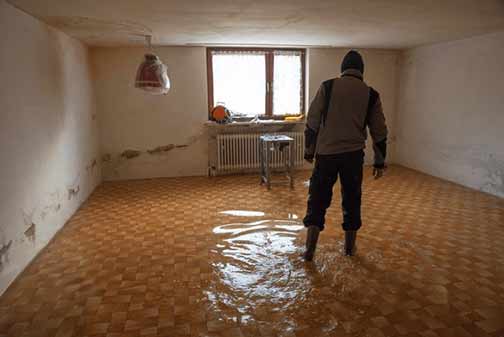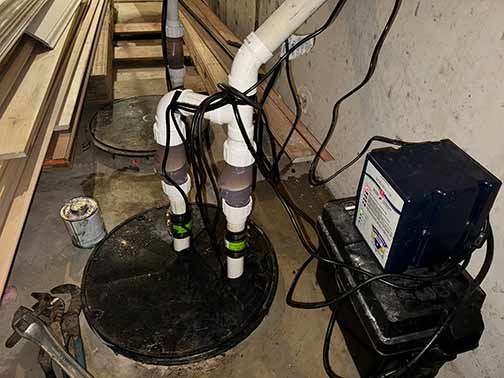
Basement flooding is a common issue in Chicago, primarily due to the city’s unique geographical and infrastructural characteristics. The city’s flat terrain, coupled with its location near Lake Michigan, makes it susceptible to heavy rainfall and subsequent flooding. Additionally, Chicago’s aging sewer system can become overwhelmed during significant rain events, leading to sewage backups and basement flooding.
Understanding the causes of basement flooding is crucial for effective prevention. Common causes include heavy rainfall, sewer backups, foundation cracks, and poor drainage systems. By identifying these causes, homeowners can take proactive measures to protect their properties from water damage and sewage backups.
Importance of Sewage Backup Prevention in Chicago Homes
Sewage backups pose a significant risk to homeowners, as they can lead to extensive property damage, health hazards, and costly repairs. Preventing sewage backups is essential for maintaining a safe and healthy living environment. Sewage backups can introduce harmful bacteria, viruses, and parasites into homes, posing serious health risks to residents. Additionally, the cleanup process can be time-consuming and expensive.
By implementing effective sewage backup prevention strategies, homeowners can reduce the likelihood of basement flooding and protect their properties from water damage. These strategies include regular maintenance, upgrades to plumbing systems, and community initiatives aimed at improving overall drainage infrastructure.
Regular Maintenance to Prevent Basement Flooding in Chicago
Regular maintenance is one of the most effective ways to prevent basement flooding and sewage backups. Homeowners should inspect their plumbing systems, sump pumps, and drainage systems regularly to ensure they are functioning correctly. Key maintenance tasks include:
- Cleaning gutters and downspouts to prevent blockages and ensure proper water flow away from the foundation.
- Inspecting and maintaining sump pumps to ensure they are in good working condition. This includes testing the pump, checking the power source, and cleaning the sump pit.
- Sealing foundation cracks to prevent water from seeping into the basement. This can be done using waterproof sealants or by hiring a professional to repair larger cracks.
- Installing backwater valves to prevent sewage from backing up into the home. These valves allow sewage to flow out of the home but prevent it from flowing back in.
By staying proactive with regular maintenance, homeowners can significantly reduce the risk of basement flooding and sewage backups.

Installing a sump pump with a battery backup to ensure continuous operation during power outages.
Upgrading Plumbing Systems to Prevent Sewage Backups in Chicago
In addition to regular maintenance, upgrading plumbing systems can help prevent sewage backups and basement flooding. Some effective upgrades include:
- Installing a sump pump with a battery backup to ensure continuous operation during power outages. This is particularly important during heavy rainstorms when power outages are more likely to occur.
- Upgrading to a more efficient drainage system that can handle higher volumes of water. This may involve replacing old pipes with larger ones or installing additional drainage channels around the property.
- Implementing a rain garden or permeable pavement to reduce the amount of runoff entering the sewer system. These eco-friendly solutions help absorb and filter rainwater, reducing the burden on the city’s drainage infrastructure.
- Installing a backwater valve or check valve to prevent sewage from flowing back into the home. These devices are particularly useful in areas with a high risk of sewer backups.
By investing in these upgrades, homeowners can enhance their property’s resilience to basement flooding and sewage backups.
Community Initiatives for Improved Drainage Infrastructure in Chicago
While individual efforts are essential, community initiatives play a crucial role in preventing basement flooding and sewage backups. Collaborative efforts can lead to significant improvements in the overall drainage infrastructure, benefiting entire neighborhoods. Some effective community initiatives include:
- Advocating for infrastructure improvements, such as upgrading the city’s sewer system to handle higher volumes of water. This can involve lobbying local government officials and participating in community meetings.
- Participating in community clean-up events to remove debris from storm drains and prevent blockages. These events can help raise awareness about the importance of proper drainage and encourage residents to take action.
- Supporting green infrastructure projects, such as the installation of rain gardens, green roofs, and permeable pavements. These projects help reduce runoff and improve the overall drainage capacity of the area.
- Educating residents about the importance of proper waste disposal and the impact of flushing inappropriate items down the toilet. This can help reduce the risk of sewer blockages and backups.
By working together, communities can create a more resilient and flood-resistant environment, reducing the risk of basement flooding and sewage backups for all residents.
Emergency Preparedness for Basement Flooding in Chicago
Despite taking preventive measures, it is essential for homeowners to be prepared for potential basement flooding. Having an emergency plan in place can help minimize damage and ensure the safety of residents. Key steps for emergency preparedness include:
- Creating an emergency kit with essential supplies, such as flashlights, batteries, a first aid kit, and non-perishable food items.
- Developing a family emergency plan that includes evacuation routes and communication strategies in case of flooding.
- Storing important documents and valuables in waterproof containers or on higher levels of the home to protect them from water damage.
- Installing water alarms in the basement to provide early warning of potential flooding. These alarms can alert homeowners to rising water levels, allowing them to take action quickly.
- Keeping a list of emergency contacts, including emergency plumbers in Chicago, electricians, and restoration companies, to ensure prompt assistance in case of flooding.
By being prepared for emergencies, homeowners can reduce the impact of basement flooding and protect their families and properties.

Homeowners should review their insurance policies to ensure they have adequate coverage for water damage and sewage backups.
Insurance Considerations for Basement Flooding in Chicago
Insurance can provide valuable financial protection in the event of basement flooding. Homeowners should review their insurance policies to ensure they have adequate coverage for water damage and sewage backups. Key considerations include:
- Understanding the difference between standard homeowners’ insurance policies and flood insurance. Standard policies typically do not cover flood damage, so it may be necessary to purchase separate flood insurance.
- Reviewing the policy’s coverage limits and exclusions to ensure they align with the homeowner’s needs. This includes checking for coverage of sewage backups, which may require an additional endorsement.
- Documenting the home’s contents and taking photos of valuable items to facilitate the claims process in case of flooding.
- Contacting the insurance provider to discuss any questions or concerns about coverage and to make any necessary adjustments to the policy.
By understanding their insurance coverage and making any necessary adjustments, homeowners can ensure they are financially protected in the event of basement flooding.
Conclusion: Proactive Measures for a Flood-Resilient Home in Chicago
Reducing the risk of basement flooding and sewage backups in Chicago requires a combination of regular maintenance, plumbing system upgrades, community initiatives, and emergency preparedness. By taking proactive measures, homeowners can protect their properties from water damage, ensure the safety of their families, and contribute to a more resilient community.
Understanding the causes of basement flooding, the importance of sewage backup prevention, and the benefits of community collaboration are essential for effective flood risk management. With the right strategies in place, homeowners can minimize the impact of basement flooding and enjoy greater peace of mind.